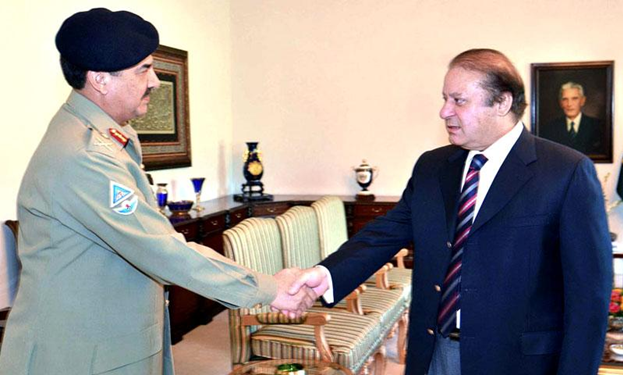The Two Sharifs Meet Amidst Continuing Protests in Pakistan, Army in Drivers Seat
Pakistan Army Chief General Raheel Shareef with PM Nawaz Sharif in happier days.

NEW DELHI: The protests being led by Pakistan Tehreek-i-Insaf (PTI) and Pakistan Awami Tehreek (PAT) that are demanding the resignation of the Pakistan Muslim League - Nawaz (PML-N) led government, were the key area of discussion in a meeting between Pakistani Prime Minister Nawaz Sharif and Chief of Army Staff (COAS) Gen Raheel Sharif.
A statement from the PM’s house read, “There was a consensus on the need to resolve the ongoing issue expeditiously in the best national interest.”
The meeting is important given the central role of the army in Pakistani politics, where it has grabbed power through coups on multiple occasions. Although rumours persist that the army may have orchestrated the current crisis to weaken the civilian government, there has been no move from the army to indicate that it is interested in grabbing power, with it mandating the civilian government and the anti-government political parties to negotiate independent of its involvement.
However, the army could use the current crisis to pressurise the civilian government, with which it reportedly shares a strained relationship.
In an ironical development, the political crisis and the Sharif government’s decision to deploy the army to sensitive areas in Islamabad, is indicative of the civilian administration’s continuing dependence on the military in Pakistan.
Although the COAS and the PM have accorded priority to the resolution of the ongoing crisis, the political impasse continues, with talks between the PAT, PTI and the Sharif government breaking down.
PTI and PAT pulled out of the talks saying that the government was trying to prevent movement in Islamabad’s “red zone,” where the marches led by the two parties, respectively, had reached, eventuating in a sit-in, before talks commenced on Thursday.
PTI leader and member of the negotiations committee Arif Alvi told Pakistan’s Dawn News, “They should tell us where they want to take this dialogue. They have ‘containerised’ us. It is impossible to get into or out of the Red zone… We cannot negotiate with them as long as they continue with their crackdown (against party workers).”
Pakistani media reported that whilst PTI’s main demand was to push for Nawaz Sharif’s resignation, PAT’s agenda was centred on the resignation of the Pakistani Prime Minister’s brother, Punjab Chief Minister Shahbaz Sharif.
As Khan and Qadri pushed through with their demands, the National Assembly passed a resolution rejecting the PTI’s and PAT’s “unconstitutional demands.” At a Thursday session of the NA, a resolution demanding the supremacy of the constitution and law, was unanimously approved.
Earlier, the United States issued a strong statement condemning Khan and Qadri’s actions, saying extra-constitutional transfer of power in Pakistan is unacceptable, and that those “attempting to impose these changes” should refrain from doing so. “Nawaz Sharif was elected and is prime minister. There is a government that was elected and is in place,” Marie Harf, State Department deputy spokesperson, said, adding ““We support the constitutional and electoral process in Pakistan...That was a process they followed, an election they had, and we are focused on working with Pakistan… And we do not support any extra-constitutional changes to that democratic system or the people attempting to impose them.”
Khan, in turn, accused the US of interfering in Pakistan’s internal affairs, adding that the Pakistan Muslim League - Nawaz (PML-N) government is a “servant of the US” that “polishes the shoes of the Americans”.
Referring to his main charge, Khan, who is calling for Sharif’s resignation based on suspicions that the elections were rigged, asked, “If an election took place in the US and a Congressman said that a majority of the votes could not be verified, wouldn't that constitute a full blown enquiry in America?”
Qadri, who has found common ground with Khan on the issue of Sharif’s resignation, differs on the grounds that the PAT movement, instead of calling for fresh elections as Khan is, wants to replace the current government with a national government composed of technocrats.
Both leaders have led their marches, with the PTI’s “Azadi” March and PAT’s “Inquilab” March, that commenced on Pakistan’s Independence Day 14 August, to Islamabad, vowing to push through till Sharif and his cabinet resign.
Although the Sharif government had not moved to stop the marches, its actions demonstrated that it took the challenge seriously. This would explain the ban on gatherings, the impounding of vehicles, the closing of petrol stations and the deployment of troops to Islamabad. Ironically however, Sharif’s decision to deploy the army has given his critics more fodder, seemingly indicating that Pakistan’s civilian administration is still heavily reliant on the country’s military, which has ruled Pakistan through a series of coups, for protection.



